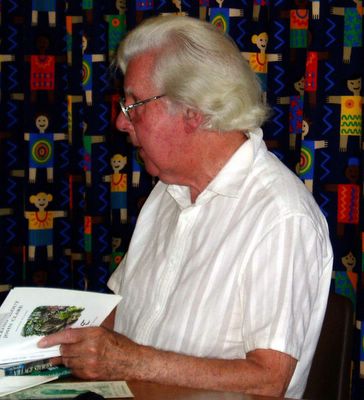
[Ronnie at the John Clare Society Festival - July 2006]
A scholar has sent me his take on a John Clare poem, "Graves of Infants". Simultaneously in the press, I read about the Pope's having to deal with limbo. Look up limbo. Oh, my goodness. "Those in limbo are excluded from supernatural beatitude, but according to St Thomas Aquinas enjoy full natural happiness. The existence of limbo is a matter of theological opinion on which the Church has never pronounced definitely either way."
But then we come to limbus infantium - unbaptised babies who, although born in original sin, are innocent of personal guilt. In fact, although many a child was too ill to make the font, it would have had the midwife's sign of the Cross on its forehead, and her speedy "In the name of the Father ..." the minute it emerged, infant mortality and her grubby hands being what they were.
"Limbo ... mumbo-jumbo ...", murmured a voice on the radio. I suppose that the Church does have to turn out its medieval attic now and then. Here comes John Clare, however, father of nine, survivor of twins, and sanest of poets where children, and what we now dub ecology, are concerned. Rural religion and economics have frequently shown their madness when we compare them with what he preached.
In "Graves of Infants", he enters the vast sadness of 19th-century child mortality. You raised some, you lost some, they said. Victorian literature is full of what most families experienced, the death-beds of boys and girls. Country churchyards are full of children - city ones, too, of course. Should a child die now, it shakes the entire parish. Whether by disease or accident, it is unnatural to us. But not long ago it was entirely natural; for nature itself was tragic, as Clare knew all too terribly.
In June 1844, from Northampton Asylum - his "Mad House" - came his reconciling conclusion to the common fate of many children. It was the only answer that he could make sense of. Brief life or long life, they were no more than aspects of nature.
God is their parent, they need no tear...
A bud their life-time, and a flower to close...
All prayers are needless - beads they need not tell;
White flowers their mourners are, nature their passing bell.
[Church Times - Friday, 20th October, 2006 (excerpt)]




No comments:
Post a Comment